
Printable edition
- President’s Message, June 2022
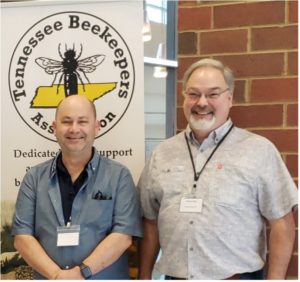
Fred Smith with David Hale, president of the TN Beekeepers Association
Hello fellow beekeepers,
I hope this edition of the newsletter finds you and your bees well, enjoying our lovely spring weather!
As for many of you, my Spring has been marked with typical busy, sometimes hectic tasks. When asked “what have I been up to or what did I do last weekend?” my typical response is “just worked on the bees.”
In reality though, Spring management means thousands of things, from making splits, getting hive bodies ready, installing queens, adding honey supers, moving hives for the apple pollination, and the ever-important monitoring for mites.
Sometimes, I can accomplish this multitude of tasks in a timely fashion, and sometimes life happens.
Luckily for me, spring is a glorious time with our wonderful nectar flows across the state. A good nectar flow helps the bees tolerate some of my management errors and transgressions. I’m enjoying my bees along with the work, appreciative of the nectar flow, and grateful for the bee’s tolerance. Spring is a wonderful time of year.
I recently had the opportunity to attend the Tennessee Beekeepers Association Annual Conference held this year at Middle Tennessee State University. Please don’t think that I am cheating on my beloved Maryland! Quite the contrary, it was a great opportunity to hear speakers I’ve never heard, and see how other conferences are organized and operate.
If you have an opportunity to attend another state’s conference or simply another local bee club’s meeting, I’d highly recommend it. So, take a cue from your bees and be social.
In fact, I’ve got my sights on the Eastern Apiculture Society’s (EAS) Annual Conference this year in Ithaca NY. Please join me in thanking Jim Fraser as our interim delegate to EAS, and welcoming Clyde Strang as our incoming EAS Director. Feel free to reach out to him with any questions you may have about that association. You can also find information on their website. www.easternapiculture.org
Last but certainly not least, on behalf of the entire association, I’d like to thank former MSBA presidents Kim Mehalick and Allen Hayes for the great educational courses they organized and offered this spring. The Nucs & Splits class was a sell out, and rightfully so. They and their teams did an amazing job, arranging the venue, speakers, and topics.
Sometimes sustainability requires our ability to make nucs and splits. Thank you Kim and team for your work helping to ensure the sustainability of our bees and apiaries in Maryland.
The Honey Judging course, led by Allen Hayes, was a sell out too. This especially makes me happy, because learning to judge honey arms you with the knowledge of what makes a great jar of honey. Making great jars of honey and great hive products pays dividends to us all, since we all are just ambassadors of our bees. We owe it to our bees to present their products in the most appealing manner!
All the best,
Notes from the Apiary Inspector
- Notes from the Apiary Inspector
Cybil Preston, State Apiary Inspector, MDA
Happy Almost Summer....or should we say SWARMAGEDDON!
Weather has been SUPER unpredictable, with fluctuating temps from the 60s to the 90s, and it seems like every time I make a plan it RAINS!!! What a crazy Spring.
Original swarms and residual swarms seem to be a very common theme this year...along with "I think I am queenless."
Apiary Inspectors and inspections are in FULL swing. We had a large amount of nuc inspection requests, seemingly more than normal. Bees seemed to have overwintered better than they did last year and were ready for splits early in the Spring.
MDA will again participate in the National Honeybee Survey. I am looking for beekeepers with 8 or more beehives in the same location who would be willing and wanting to participate. The survey is free of charge: an inspector will take 1/3 cup samples of bees from each colony, and bee bread for the double sampling. Tests are then run on the samples and the beekeeper will later receive a detailed print out and run down of hive issues and virus presence and prevalence. Anyone wishing to participate should contact me: Cybil.preston@maryland.gov.
We are again participating in the Invasives/Asian Giant Hornet Survey. Currently we have traps at the Port of Baltimore, BWI Airport and a suburban location.This survey looks for Apis ceranae, Tropilaelaps, Asian Giant Hornet etc.
I would like to encourage the local beekeeping associations and ALL beekeepers to enter Club displays and educational exhibits in the Maryland State Fair. The Maryland State Fair has NEW Dates to enter exhibits: Sunday, August 21, 2022, from 3PM to 8PM, and Monday, August 22, 2022, from 9AM to 7PM. Honey judging will take place on Tuesday 8/23/2022. The Fair will open on Thursday 8/25/2022 and be open til 9/11/2022. Take the summer to prepare your entries so we have a GREAT show in August! It's FAIR-iffic!
The honeybee disease detector dogs are now on VACATION til the fall when weather gets colder. They are currently spending their days snoozing and swimming.
MDA Apiary Inspection Service has hired a new apiary inspector for Central Maryland: David Schultz! He will cover Carroll and Frederick counties as well has help me with the National Honeybee Survey samplings. David brings an extensive educational background as well as his knowledgeable apiary inspection skills. If you are in one of his counties please reach out and say hello.

Cybil Preston
Chief Apiary Inspector
State Apiarist
EAS Certified Master Beekeeper
Maryland Department of Agriculture
50 Harry S. Truman Parkway
Annapolis, Maryland 21401
cybil.preston@maryland.gov
(410) 841-5920(O)
(410) 562-3464 (M)
Hive Tour book from MSBA's Frank Linton and Phil Frank
- “Hive Tour” by members Frank Linton and Phil Frank: a visual guide to the wonder of bees
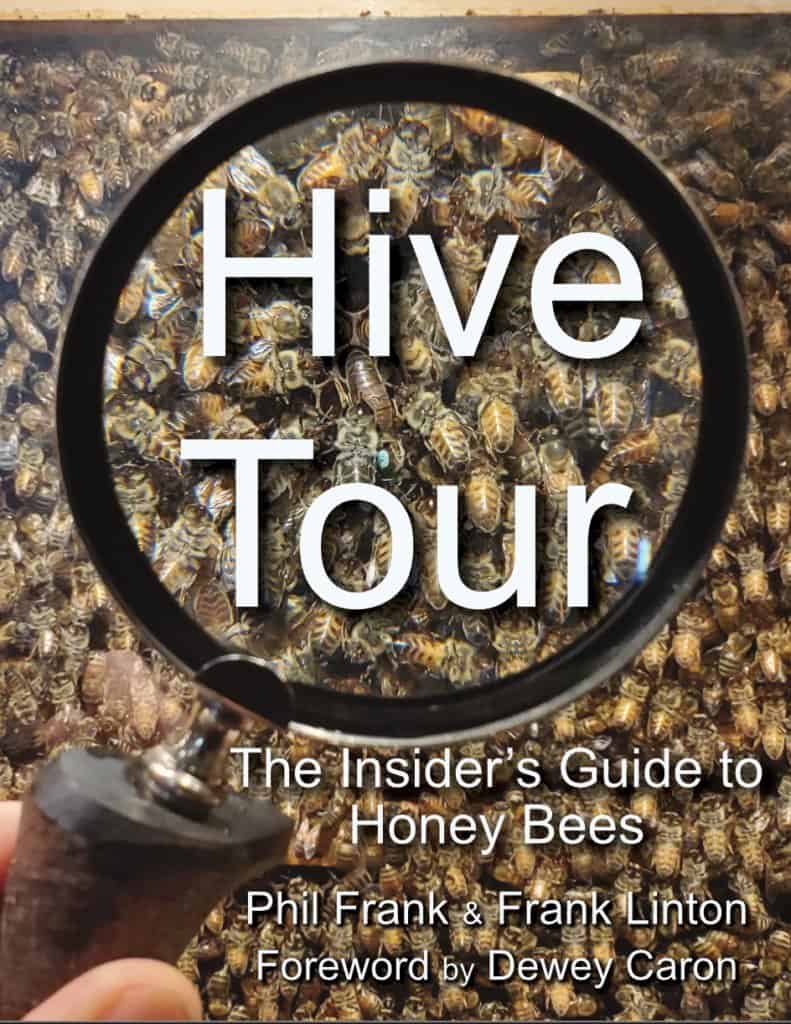
EAS Master Beekeeper Frank Linton and MSBA's own webmaster, Phil Frank, recently published a "travel guide" to the inside of a hive: Hive Tour, with a forward by Dr. Dewey Caron.
The book's pages are made up of clear, close up photos of key elements of the inside of a living bee colony, with explanatory labels and call outs. The book is organized to help the reader zero in on the areas that interest them most, including the hives themselves, bees at different life stages, the anatomy of bees, behaviors, pests, and more!
As Phil points out, "Vivid imagery is clearly annotated, guiding you to the most interesting sights."
Dr. Caron offers strong praise. "[They] have created a fascinating, visual journey through the mysterious beehive. Hive Tour guides us, with full page photos and clear signage, to find how honey bees literally shape their world and live their lives as uniquely social creatures... The coverage of the material is impressive...Hive Tour will even help you find body parts, from end to end (or antennae to stinger)!"
Frank has previously published The Observation Hive Handbook. (with Clarence Collision), and both he and Phil are members of the Montgomery County Beekeepers. For that club, they help support the observation hive maintained at the Brookside Nature Center. The staff who present the observation hive to the public asked for guidance on what to demonstrate and how to explain it: working on this material, Phil and Frank realized that the tools they were pulling together could be used in many settings that include an observation hive, as well as for beginning beekeeping and others who are simply curious about bees.
Frank and Phil spent two years, off and on, developing this material. The book has just been released, and is available for purchase ($25) on Amazon.
Want a detailed look inside? Click HERE

EAS 2022 in Ithaca August 1-5
- EAS 2022 in Ithaca: “Beeing Social, Again”
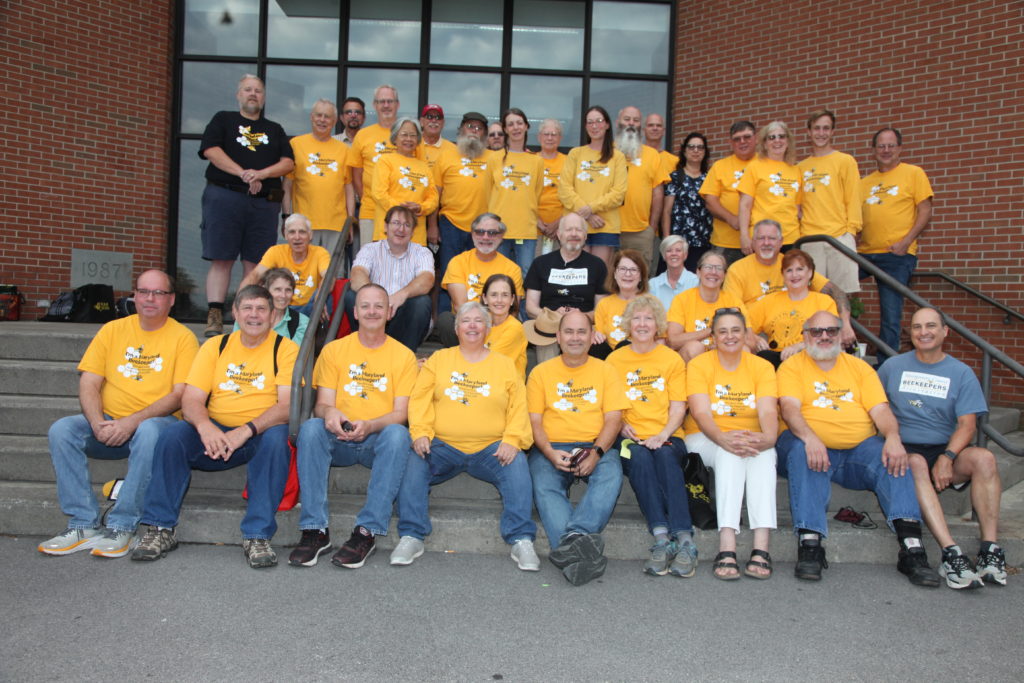
MSBA Members representing Maryland at the 2022 EAS Conference 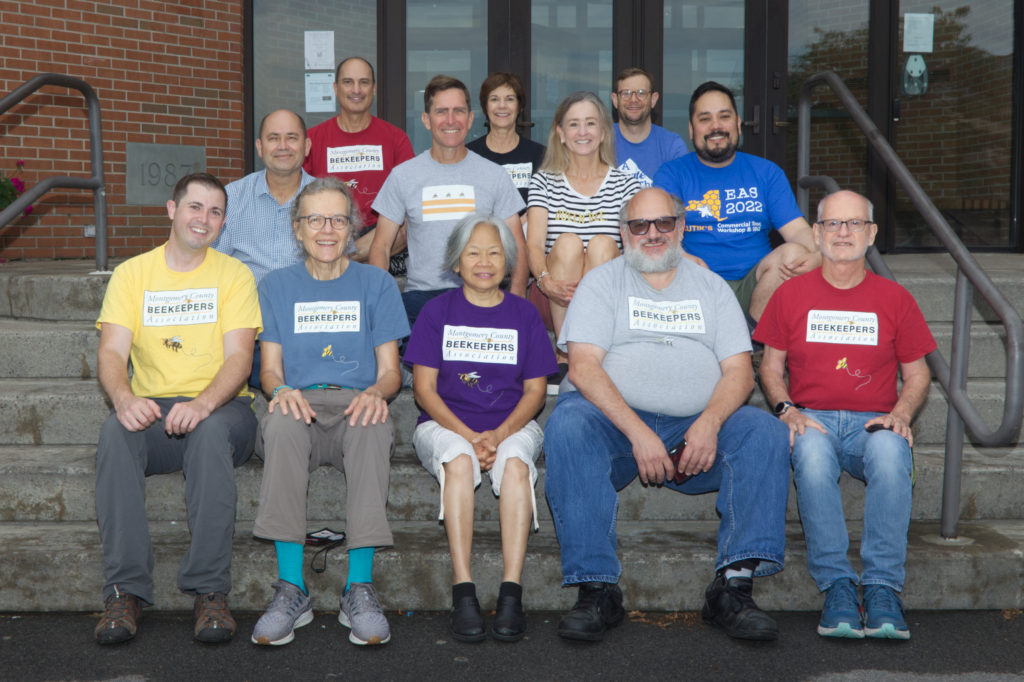
MSBA Members representing Maryland at the 2022 EAS Conference 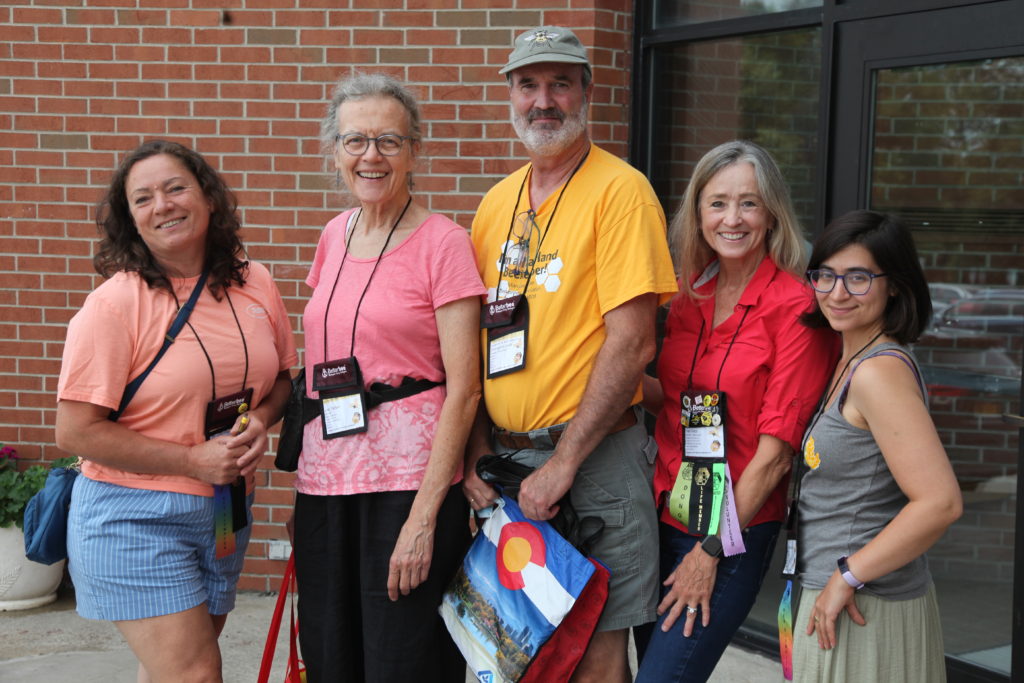
MSBA Members representing Maryland at the 2022 EAS Conference 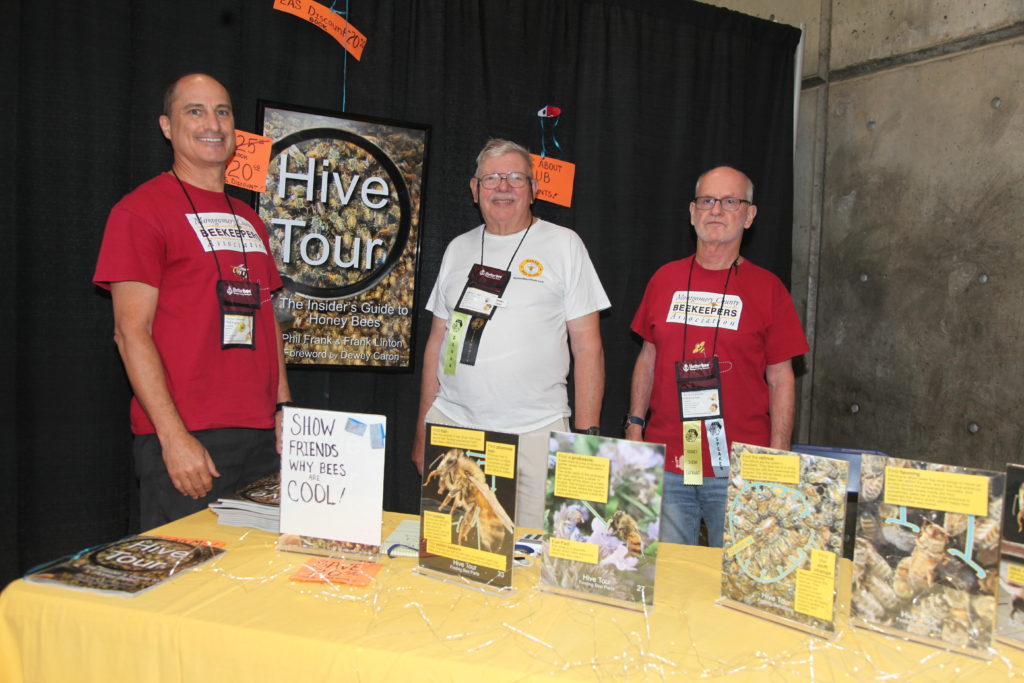
Phil Frank, Dewey Caron, Frank Linton
Selling their new book "Hive Tour" at EAS vendor table.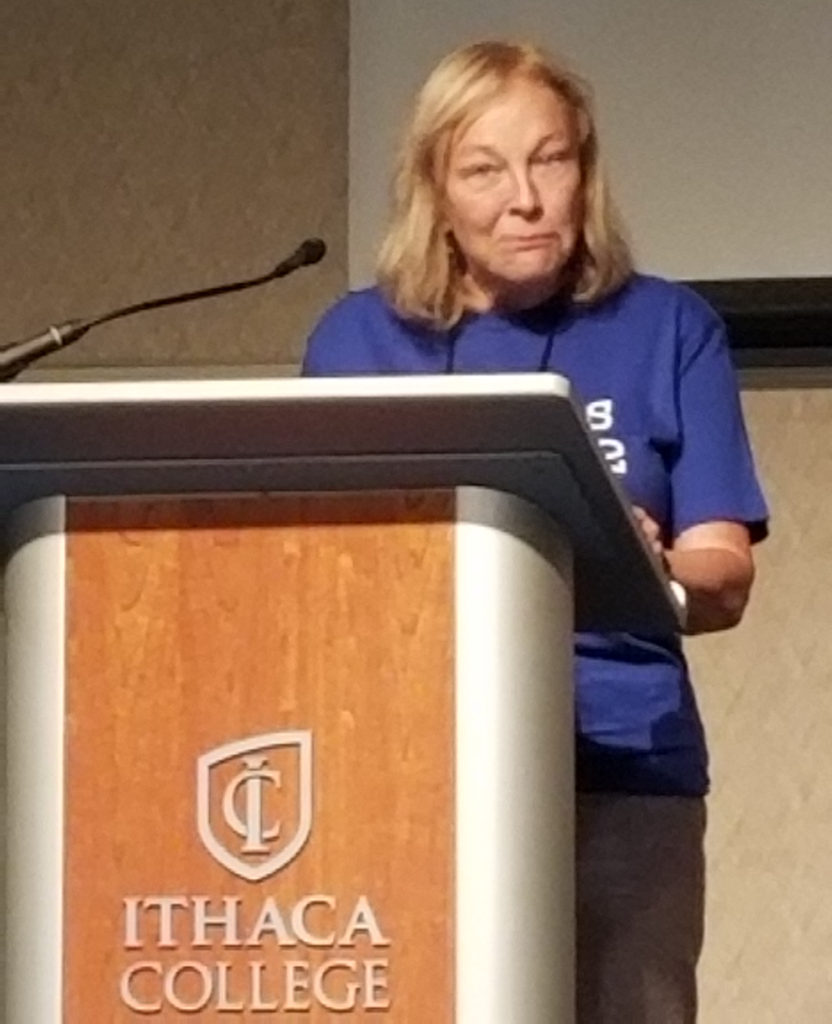
Eloise Naylor, EAS Board Chairperson The Eastern Apicultural Society Conference for 2022 will take place August 1-5 at Ithaca College in Ithaca, NY!
EAS 2022 is the Eastern Apicultural Association's first full-fledged conference since the Covid-19 pandemic. The abbreviated program in Kentucky last year was wonderful, and the whole beekeeping community is looking forward to having a full program that will include the honey show, children’s program and short course this year. Ithaca weather can be quite changeable, so bring a rain coat or umbrella. Long socks are a good idea to avoid picking up ticks on off-campus excursions.
The three-day EAS short courses will be held on Monday, August 1st through Wednesday, August 3rd. The main conference will then run from Wednesday, August 3rd to Friday, August 5th. The purpose of the Short Course is to provide a wide selection of topics of interest to many levels of experience. That said, attendees can, for the most part, join a single session or stay in a track for the entire day. The tracks this year include a Beginner Track organized by the Master Beekeepers, an Intermediate Track that on Managing Your Colonies, and the Advanced Track of the Business of Beekeeping on the Monday and Honey, Hive Products and the Honey Show on Tuesday.
The morning of August 1st, EAS will offer three lectures on microscopy at Ithaca College, covering anatomy, pollen and Nosema spp. This will be followed by an afternoon of dissecting bees and examining pollen and Nosema samples at the College of Veterinary Medicine. The lecture is open to all, but the field trip for the laboratory work will be limited to 50 registrants.
One Tuesday, August 2nd, EAS will offer Queen Rearing with Scott McArt and Mike Palmer at the Dyce Laboratory, Cornell University. This day-long track will cover topics such as the principles and practice of preparing a cell starter and finisher, practice catching and marking queens, choosing frames to graft and grafting. You may be able to take a queen cell home with you! This program will be limited to 30 participants.
The three-day main conference will run from Wednesday, August 3rd to Friday, August 5th. The morning sessions will provide plenary speakers and the afternoons will include 4-5 workshop tracks as well as apiary sessions. Plenary speakers are Dr. Dave Tarpy, Michael Palmer and Dr. Tom Seeley. The EAS Hambleton Award 2022 awardee Dr. Stephen Pernal from Alberta, Canada and Emma Mullen Walters, the Roger Morse Award awardee for 2022 will provide additional plenary addresses in the mornings. Further sessions with these keynote speakers are scheduled in the afternoon workshop sessions, so plenty of opportunity to learn from the best!
Our vendors will have a large venue in which to demonstrate and offer their latest equipment and products – always a highlight of an EAS conference!
Additional social events will include a “Dine around Ithaca” on Monday evening with registrants joining a local beekeeper at one of the varied restaurants in the area to chat bees and sample the local culinary scene.
The Ithaca area offers many local activities including hiking, boating and fishing in public parks and waterways and dining opportunities to fit any palate and budget. Accommodations range from camping to dormitory accommodations to motel and hotel venues – something for everyone. The area is known for the production of wine and abounds with wineries and meaderies allowing you to sample the products of our local vineyards and apiaries.EAS will be following the Ithaca College COVID Health & Safety Guidelines in place on the dates of the Conference. Detailed information regarding the Ithaca College COVID Health & Safety Guidelines will be provided two weeks prior to August 1st. [more information]
You can join the EAS at www.easternapiculture.org. It really is a great way to take your beekeeping to the next level and support a nonprofit organization whose mission is to support beekeeper education and honeybee research.
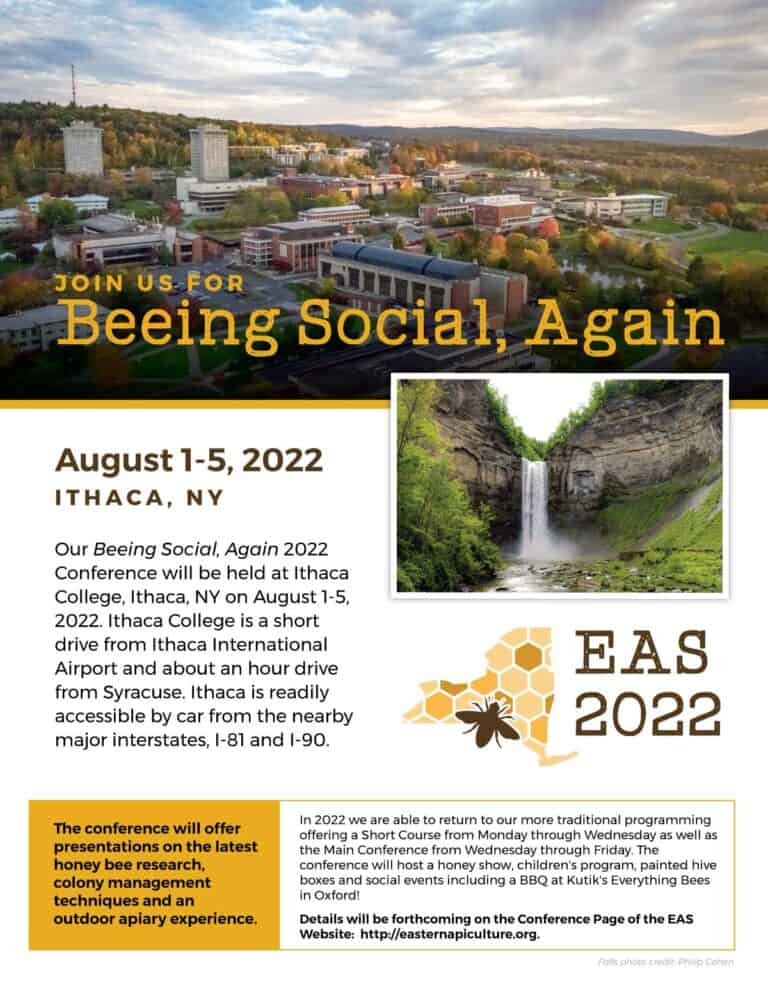
Apimondia 2022 IS ON in Istanbul
- Apimondia 2022: Istanbul, Turkey August 24-28
Apimondia 2022 will take place after all! The slogan for this year is “Bees Unite the World." Many of you may also recognize Apimondia's President, Dr. Jeff Pettis, as a beloved member of our own beekeeping community.
The 47th Apimondia Congress will be in Istanbul! The venue is the same one we used in 2017 and so some of you will know what a wonderful setting this venue provides for a successful ApiExpo and Apimondia Congress. For those of you who could not join us in 2017, now is your chance to come to a vibrant city where East meets West, with a great international airport and convenient central location. We are busy planning an exciting programme on bees, keeping and all aspects of our craft.
The 47th Congress was originally planned in Ufa, Russia in 2021 and then postponed due to COVID to 2022. We have moved the location for the 47th Apimondia Congress to Istanbul, Turkey, where we know we can host a great meeting on such short notice.
The conference includes the amazing ApiEXPO of vendors from all over the world (Russian vendors will not be included this year), as well as oral and poster presentations of scientific topics. The conference also sponsors technical as well as general interest tours, details of which are being developed.
Covid-19 travel rules
Thanks to the lowest number of cases in the country since the start of the pandemic and to the nearly 90% vaccination rate, with the decision of the authorities of Turkish Republic, as of 1 June 2022:- Submitting vaccination certificate for Covid-19 before entering Turkey and
- Submitting negative PCR or rapid antigen test results for Covid-19, which was requested for passengers who were not be able to submit vaccination certificates, requirements have been cancelled.
Therefore, there is no requirement of vaccination certificate and/or PCR or antigen tests.
Easy access
Istanbul is considered to be one of the main air traffic hubs connecting many international airlines from Europe to Middle-East, Asia and Africa. Thanks to the Turkish Airlines massive network (flying to more countries in the world than any other airline) Istanbul became a more popular and widely visited destination with two international airports in each continent.
Easy Visa
Visas are required for entry into Turkey by nationals of most countries. The E-Visa system allows nationals of 103 countries to easily obtain their e-Visas online. Citizens of 89 countries can enter Turkey without any visas for 30, 60 or 90 days.Apimondia 2023 îs being planned for Santiago, Chile!
Bees at St. E's/DHS HQ
- Bees at St. E’s: Kim and Mike Mehalick Establish Pilot Apiary at DHS HQ
Early on the morning of Friday, May 20, 2022, about a quarter million new residents arrived at a level-5 security location with a special mission: pollinating the beautiful and historic St. Elizabeth's Campus, home of the Department of Homeland Security and the US Coast Guard!
Past MSBA President Kim Mehalick, and her husband (current BUMBA President) Mike, placed 4 colonies of their own in the new apiary onsite, with future. plans to include colonies run by DHS staff and visiting military members. This was the culmination of several months of planning and cross-club cooperation, and a banner day for the bees!
They worked with numerous government parties to craft access and deliverable requirements that work for the many thousands of people, as well as bees, who use this location everyday. The Mehalicks will also be involved in outreach onsite and will share the sweet harvest they expect there! Though the initial phase is limited to 4 colonies, it is hoped that military personnel who are stationed at St. E's will eventually have the opportunity to set up and manage colonies there.
This didn't happen overnight. DHS reached out to the DC Beekeepers Alliance, as the local beekeeping club, to begin planning the inclusion of bees, which took place with the support of the DHS Secretary's Office. DCBA was able to provide a number of assists: the club had previously set up apiaries at major public utilities and secure sites, and has signed memoranda of understanding with a number of government and community organizations that provided guidance and basis for discussion as the new apiary was planned. DCBA also invited DHS and General Services Administration staff to participate in its 2022 Beginners Course. The club was also able to advise on the proper permitting needed to move bees on comb into DC.
It was equally important to identify beekeepers with the requisite beekeeping, federal government, and organizational experience to manage such a multifaceted project...as well as enough colonies to spare! DCBA was proud to leverage it's ties to MSBA and BUMBA to help this project take root and then fly.
Kim mentions, "It was a long process, involving months of discussions and emails. It was fortunate that we had other institutional apiary projects with the local club that helped inform otherwise uncharted waters for both us and our host agency."
The St. Elizabeth Campus team was excited and motivated to help make this happen. The site has on-staff horticulture and environmental specialists interested in how the site can support both managed and native pollinators, as well as a proud historical preservation mission. Located just above the river and National Airport, the bees have access to acres of prime green space.
Since starting up, the Mehalick have had visitors continually pop up while working the bees, and the director of the campus actually presented them with a challenge coin and his sincere thanks for the project. One great sign from the bees? A nuc with a queen cell they brought onsite has successfully mated, raising a beautiful amber St. Elizabeth's native queen for the season ahead.
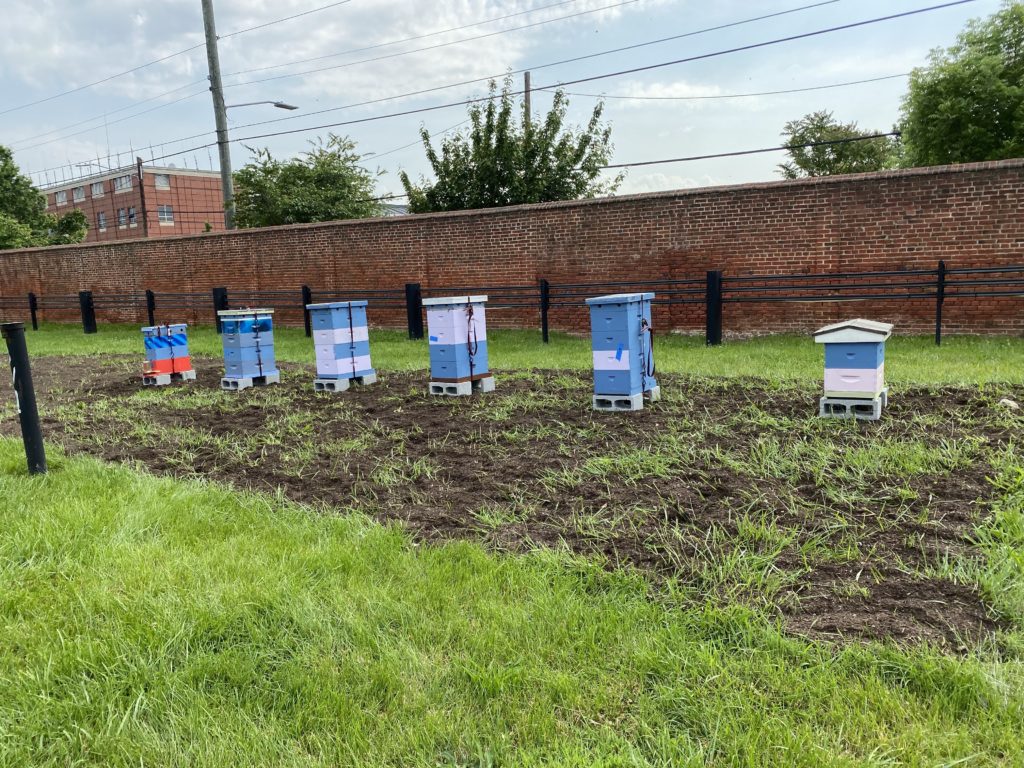
Beekeeping News and Notes
- Beekeeping News and Notes: June 2022
Free Pub: "Distinguishing Asian Giant Hornet Damage to Honey Bee Colonies"
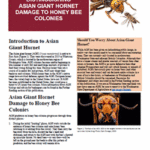 Dr. Kelly Kulhanek (formerly of UMD!) and Dr. Brandon Hopkins of Washington State University have prepared a free, downloadable publication about Asian Hornet damage to honey bee colonies. The publication includes a quick and helpful overview of hornet behavior and its impact on European honey bees, as well as guidance about why most beekeepers IN WASHINGTON EVEN do not need to be concerned. There are photos of other kinds of damage, including from pygmy shrews, that we do have here, as well as further reading for those who want to learn more about this VERY FAR AWAY invasive pest. [More info]
Dr. Kelly Kulhanek (formerly of UMD!) and Dr. Brandon Hopkins of Washington State University have prepared a free, downloadable publication about Asian Hornet damage to honey bee colonies. The publication includes a quick and helpful overview of hornet behavior and its impact on European honey bees, as well as guidance about why most beekeepers IN WASHINGTON EVEN do not need to be concerned. There are photos of other kinds of damage, including from pygmy shrews, that we do have here, as well as further reading for those who want to learn more about this VERY FAR AWAY invasive pest. [More info]
Dr. Samuel Ramsey to Set Up, Lead Lab at University of Colorado/Boulder
 On June 1, Dr. Samuel Ramsey announced that the University of Colorado at Boulder has offered him the opportunity to build his own lab, with research taking place both in the US and Thailand! Officially, he is the brand new Marvin H. Carruthers Endowed Chair for Early-Career Faculty: Assistant Professor of Entomology for the BioFrontiers Institute and the Department of Ecology and Evolutionary Biology.
On June 1, Dr. Samuel Ramsey announced that the University of Colorado at Boulder has offered him the opportunity to build his own lab, with research taking place both in the US and Thailand! Officially, he is the brand new Marvin H. Carruthers Endowed Chair for Early-Career Faculty: Assistant Professor of Entomology for the BioFrontiers Institute and the Department of Ecology and Evolutionary Biology.Most of us are familiar with Dr. Ramsey through his groundbreaking work on Varroa biology, and his Ph.D. work with the vanEngelsdorp Lab at the University of Maryland. He has been a charismatic educator and even entertainer of our community, and has recently received even wider attention on national and international media outlets.
You can keep up with his continuing accomplishments and adventures through both The Ramsey Research Foundation and Dr. Sammy websites, in addition to his work at UC Boulder.
The Dose Makes the Poison: feeding Apis mellifera, with probiotics and b-vitamins
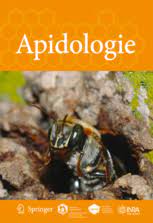 It matters what you feed your bees, and we are advised to watch the dose. More is not more.
It matters what you feed your bees, and we are advised to watch the dose. More is not more.An open access April 2022 study published in Apidologie and led by Andrew Brown of the University of Bern looked at the gut health and longevity of bees who receive feeding with probiotics and vitamins. Not surprisingly, the study found that both the chosen food and the dose had an impact on the weight and longevity of the bees.
The study used newly emerged bees which had been treated with Tetracycline, and fed them one of several diets: sucrose (sugar water, like we would give them) only, sugar water and pollen, probiotics at different doses, probiotics and pollen (low and high doses), or b-vitamins. They also had control "Frame" bees who did not receive the antibiotics but were tested with the different feeding regimes.
Honey bees who received unlimited access to pollen achieved the highest body weights, especially those who received sugar water and pollen. Researchers believe that the pollen plays an important role in "inoculating" the bees' digestive systems with beneficial flora. However, the longest lived bees were those (both in the treated and control groups!) received a low level probiotic and pollen. Higher doses of probiotics and b-vitamins reduced lifespans.
Nosema control without Fumagilin? Study looks at biocontrols
An April 2022 open access study led by Prof. Massimo Iorizzo of the Università degli Studi del Molise in the Journal of Fungi looks at options for biocontrols for Nosema disease in honey bees. Beekeepers have relied for some time on Fumagilin for control of Nosema apis, but have not been pleased with effectiveness, acceptance by the bees, toxicity or antibiotic exposure of comb and hive components. As Nosema ceranae has become predominant, Fumagilin has been even less effective.
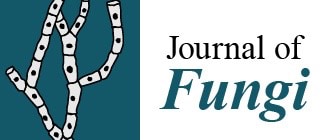
Numerous studies have shown that plant extracts, RNA interference (RNAi) and beneficial microbes could provide viable non-antibiotic alternatives. In this article, recent scientific advances in the biocontrol of nosemosis are summarized.
The scientists looked at plant extracts, beneficial microbes, and RNAi treatments. They found that the antimicrobial effects of plant extracts offered promise, but were likely linked to the gut biology of the bees. RNAi methods are still emerging, and not enough is known for practical application. They conclude that "the use of appropriate probiotics, unlike synthetic or natural chemical compounds, does not adversely affect the balance of the gut microbiota and is also a technique that can help prevent and treat nosemosis as well as positively impact honey bee welfare."
Variant of Deformed Wing Virus threatens honey bees worldwide
 On June 1, Science Daily reported that researchers led by Dr. Robert Paxton at Martin-Luther-Universität Halle-Wittenberg have determined that a new viral variant of Deformed Wing Virus (DWV-B) has replaced the already formidable DWV-A strain in Europe and is rapidly spreading, apparently causing the collapse of at least some affected colonies. The team analyzed data collected over the past 20 years, evaluating roughly 3,000 datasets for honeybees, large earth bumblebees and Varroa mites from the database NCBI. The datasets contain clues about the genetic material of the viruses. They also investigated the first scientifically documented references to the "DWV-B" variant for numerous countries. "Our analyses show that the new variant has already gained a foothold in Europe and that it will only be a matter of time before it is the dominant form around the world," says Paxton.
On June 1, Science Daily reported that researchers led by Dr. Robert Paxton at Martin-Luther-Universität Halle-Wittenberg have determined that a new viral variant of Deformed Wing Virus (DWV-B) has replaced the already formidable DWV-A strain in Europe and is rapidly spreading, apparently causing the collapse of at least some affected colonies. The team analyzed data collected over the past 20 years, evaluating roughly 3,000 datasets for honeybees, large earth bumblebees and Varroa mites from the database NCBI. The datasets contain clues about the genetic material of the viruses. They also investigated the first scientifically documented references to the "DWV-B" variant for numerous countries. "Our analyses show that the new variant has already gained a foothold in Europe and that it will only be a matter of time before it is the dominant form around the world," says Paxton.The original strain of the virus ("DWV-A") was discovered in Japan in the early 1980s and the new variant "DWV-B" was first identified in the Netherlands in 2001. "Our laboratory studies have shown that the new variant kills bees faster and is more easily transmitted," says Paxton.
Because DWV is vectored by varroa mites, it appears that it's spread has occurred more slowly in regions, such as Australia, where varroa are less widespread. Study link.
Some Bats Get A Buzz On
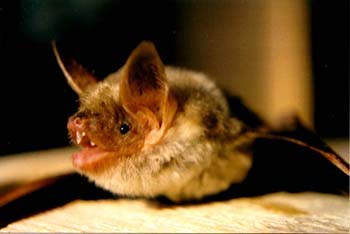
Greater Mouse Eared Bat (By Urheber: Manuel Werner, Germany, Wikipedia-Kontakt: http://de.wikipedia.org/wiki/Benutzer:Werner,_Deutschland) The May 9 issue of Current Biology includes an article by Italian researchers who have revealed what may be the first known case of a mammal mimicking the sound of an insect, in this case to deter predators. The greater mouse-eared bat (Myotis myotis) broadcasts, when handled, distress calls that imitate the sounds of stinging bees or wasps to discourage the bat’s avian predators.
The researchers noticed the unusual sounds when detangling bats they had collected from mist nets: when held in scientists' hands, the bats made a buzzing sound. Danilo Russo of the Università degli Studi di Napoli Federico II said, "When you hear them, that's what comes to your mind immediately."
The scientists later tested this idea, considering that it might be an instance of "Batesian mimicry," a known behavior when a harmless species visually, acoustically, or chemically attempts to disguise itself as one which is distasteful to predators.
The researchers collected and compared recordings of hymenopterans and bats, and found they could easily distinguish the sounds. When altering their analysis to comparison of the sounds in the wavelengths heard by the bats' predators, however, the sounds became more difficult to tell apart! They played the sounds back to captive birds from predator species, which then moved away from the sounds.
Honey Bees can be trained to identify SARS-CoV-2 infected samplesThe April 2022 edition of Biology Open includes an article by a team in the Netherlands which has determined that honeybees may be able to provide an alternative method for detecting novel, zoonotic viral diseases in both humans and animals. Such pathologies lead to detectable changes in the volatile organic compound (VOC) profile of animals, which can be monitored, thus allowing the development of a rapid VOC-based test. In the current study, the team successfully trained honeybees (Apis mellifera) to identify SARS-CoV-2 infected minks (Neovison vison) using Pavlovian conditioning protocols.
They tested two protocols to evaluate bees' performance, and designed a non-invasive rapid test in which multiple bees were tested in parallel on the same samples. This provided reliable results regarding a subject's health status. Using the data from the training experiments, researchers then simulated a diagnostic evaluation trial to predict the potential efficacy of our diagnostic test, which yielded a diagnostic sensitivity of 92% and specificity of 86%. The team hopes that a honeybee-based diagnostic can offer a reliable and rapid test that provides a readily available, low-input addition to the currently available testing methods. A honeybee-based diagnostic test might be particularly relevant for remote and developing communities that lack the resources and infrastructure required for mainstream testing methods.
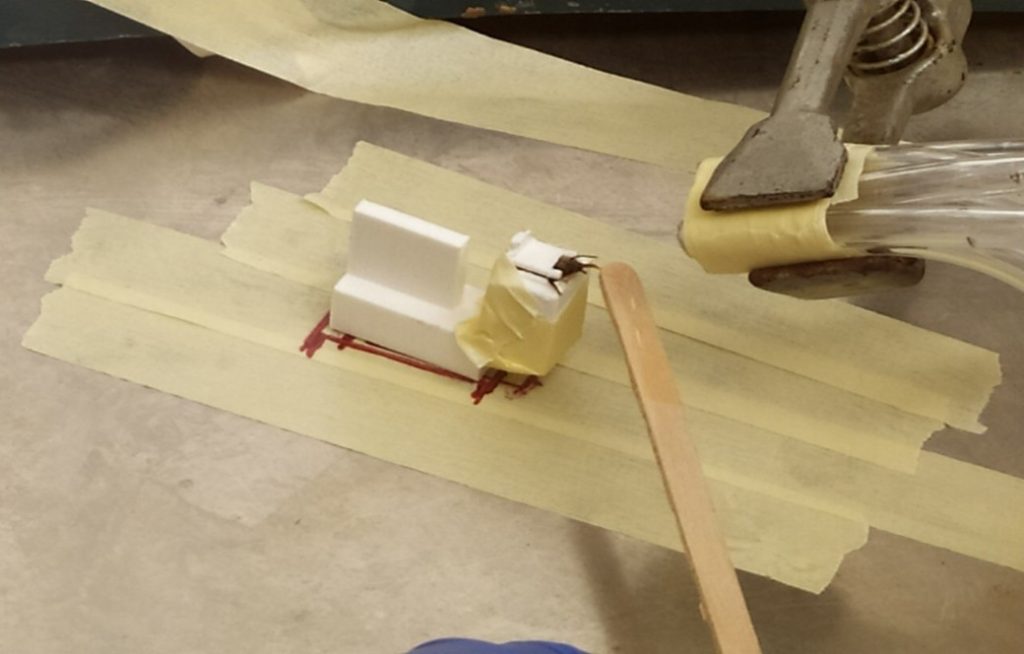
Bee being conditioned using first training protocol [Return to June 2022 BeeLine newsletter]
June 11, 2022 Meeting at UMD Information
- 2022 June 11 MEETING
WHERE: RECORDING AVAILABLE!
You must be logged in to view the recording.
Please login and return to thispage to access the view button. Thanks!
This meeting will be BOTH in-person and Zoom.
In-person attendees must continuously wear a face mask covering mouth and nose [UMD Mask Policy].GUEST SPEAKERS KAMON REYNOLDS and Dr. LEWIS BARTLETT PHYSICAL LOCATION University of Maryland
Plant Sciences Building, Room 1140 (the auditorium)
4291 Fieldhouse Dr, College Park, MD 20742VIRTUAL LOCATION Zoom (CLICK HERE when time to attend)
Optional phone-in info (audio only) ph. 1-301-715-8592. Meeting ID: 951 3660 9719
One tap mobile: +13017158592,,95136609719#TIME 9AM - 4PM (Doors open at 8:30 AM) DOOR PRIZES Today for Zoom and In-Person Attendees!!!!
- Kamon Reynolds will present two talks:
- Queen Rearing for the Small Apiary: LEARN: How to easily raise the best queens you have ever had from a 5 frame nuc.
- Great Queens, Dead Mites, and Good Nutrition. (A class about our approach to beekeeping) LEARN: what honey bees need to thrive and what you can do as a beekeeper to help them do just that!
- Dr. Lewis Bartlett will also present two talks:
- Problems and Promises of Darwinian Beekeeping
Breeding better bees remains a tantalizing and elusive goal of current US and EU beekeeping communities. Evolution is however fickle, and there are lessons we can learn from evolutionary biology to better avoid pitfalls in our bee breeding and target how we can help future bee breeds to thrive in face of Varroa and other threats. I’ll cover my own thoughts as an evolutionary biologist on how we can breed better bees, and the outcomes we’ll have to choose between.
- How do bees wash their hands? Hydrogen peroxide in the hive.
Bees work very hard to try and keep their hive clean and disease free, especially when it comes to protecting their precious and vulnerable larvae. In this lecture, we’ll cover some of the unique biology honey bees have that helps them protect against bugs both small and big, and new research updates from my lab group on how honey works so well as an antimicrobial.
- Problems and Promises of Darwinian Beekeeping
BIOS:
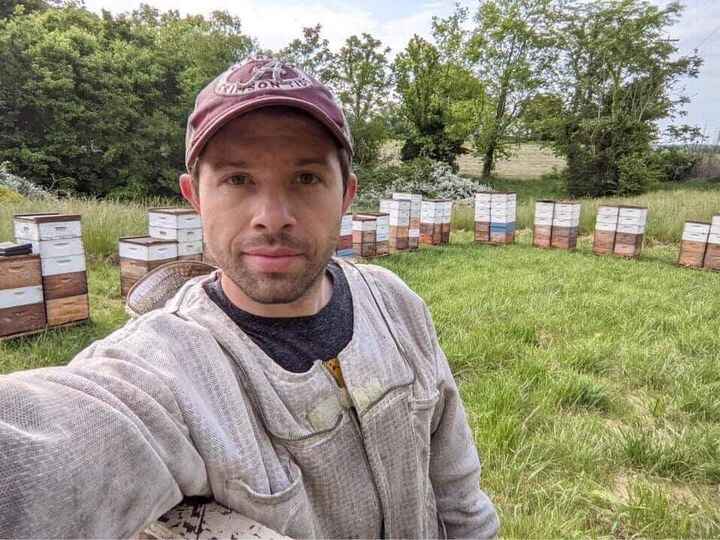
KAMON REYNOLDS is founder of the extremely successful Hive Live Conference https://www.hivelifeconference.com/ , founder of Tennessee's Bees and has been keeping bees in North Central Tennessee for 18 years.
Kamon keeps over 300 Hives, with his wife Laurel, fulltime. Kamon and Laurel also have filmed hundreds of educational videos to help new and veteran beekeepers around the world keep their bees successfully. Though Kamon does 99.9% of the talking, Laurel has been Beekeeping for 13 years, was a Beekeeper prior to their marriage, and is an invaluable part of their Business Tennessee’s Bees LLC. Tennessee’s Bees specializes in quality Bee Genetics, Pure Tennessee Honey, and Honeybee Education. Their videos can be found on https://www.youtube.com/channel/UCkoAuqRak
Kamon currently has 4.7 thousand followers on Facebook and 45.8K subscribers on YouTUBE.
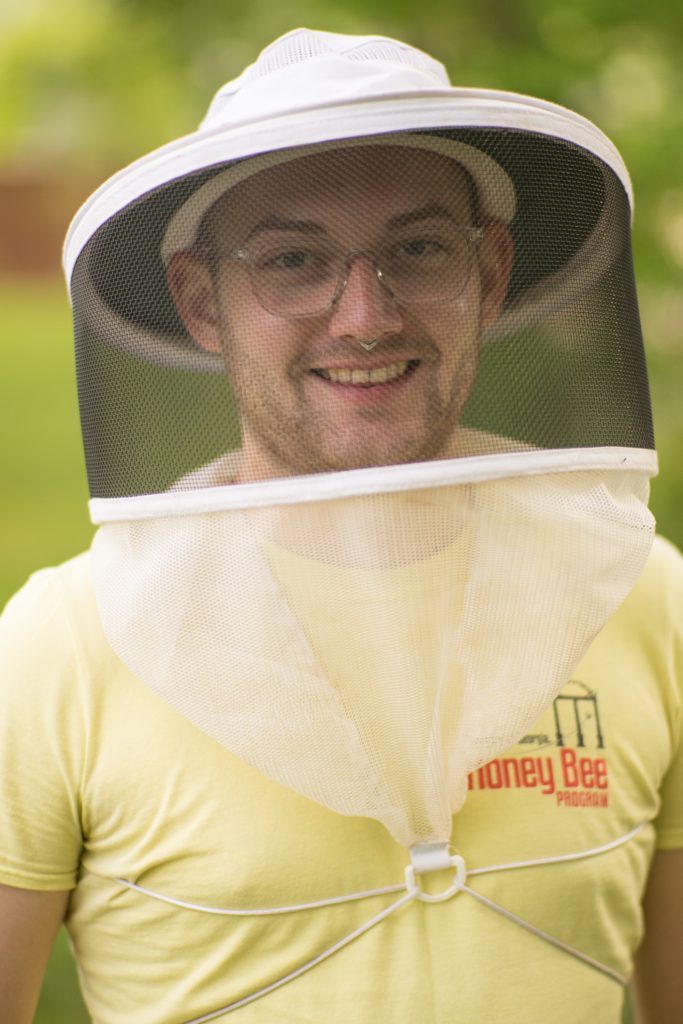
Dr. LEWIS BARTLETT is a post-doctoral fellow at the UGA Honey Bee Program and Odum School of Ecology working at the intersection of infectious disease biology and beekeeping. His research focuses on how infectious diseases and parasites cause so much harm to honey bees and how we can help honey bees defend themselves. Lewis began keeping bees ten years ago as part of scientific research and as a hobbyist in the UK before moving to America in 2016. He has worked with scientists across the UK, Europe, and USA, on topics including the risk to beekeeping from mosquito control, how sugar feed quality impacts colony immunity, the effects of crowding or moving honey bees on their viral infections, and on testing novel control techniques for pests like Varroa and Small Hive Beetles. His research goals are to inform solutions to managing honeybee diseases and pests that are effective and economically viable, always with an ear toward experiences and insights from beekeepers.
JOIN OUR MEETING - LEARN SOMETHING NEW!
AGENDA
9:00 AM Welcome Fred Smith, MSBA President 9:15 AM Apiary Inspectors Report [VIA ZOOM] Cybil Preston, Chief MD Apiary Inspector 9:30 AM How do bees wash their hands? Hydrogen peroxide in the hive [IN PERSON] Dr. Lewis Bartlett, University of Georgia Honey Bee Program and Odum School of Ecology 10:30 AM Great Queens, Dead Mites, and Good Nutrition: what honey bees need to thrive [IN PERSON] Kamon Reynolds, Founder, Hive Live Conference and "Tennessee's Bees" 11:30AM UMD Bee Squad Update [IN PERSON] Mark Dykes, University of Maryland 12 Noon Lunch 1:00 PM The Age of Bees: Longevity, why it matters, and colony loss [VIA ZOOM] Anthony Nearman, PhD Candidate, vanEngelsdorp Bee Lab/UMD 2:00 PM Queen Rearing for the Small Apiary [IN PERSON] Kamon Reynolds, Founder, Hive Live Conference and "Tennessee's Bees" 3:00 PM Problems and Promises of Darwinian Beekeeping [IN PERSON] Dr. Lewis Bartlett, University of Georgia Honey Bee Program and Odum School of Ecology 4:00 PM Closing Panel: Keynotes and Senior Beekeepers Take Your Questions [IN PERSON] Kamon Reynolds, Dr. Lewis Bartlett, Mark Dykes, Fred Smith, MaryLaura Fitzgerald 4:30 PM Meeting close Fred Smith, MSBA President FOR ZOOM ATTENDEES:
Click HERE to enter your name in the DOOR PRIZE drawing!
- Kamon Reynolds will present two talks:

